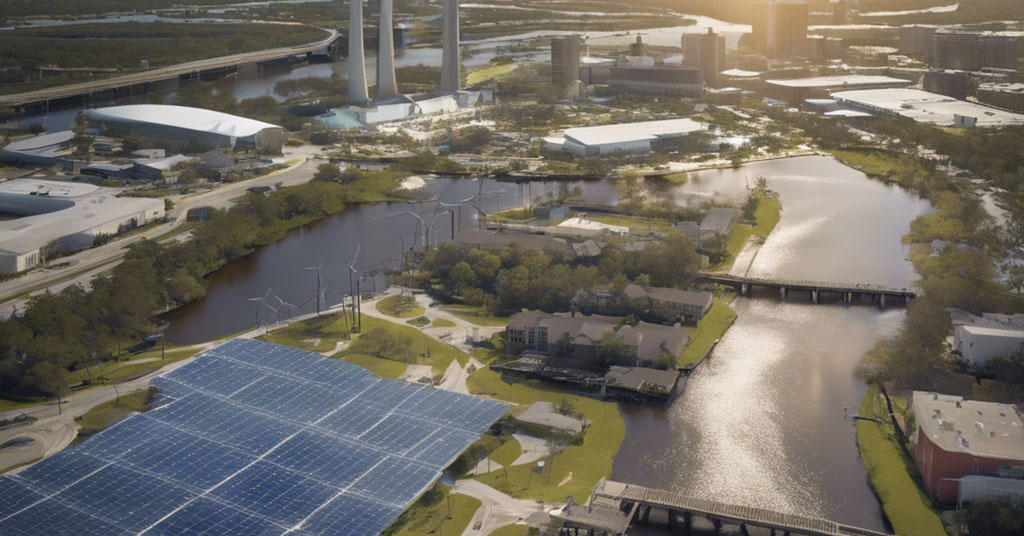

- 08 Dec, 2023
- Jacksonville
Jacksonville, Florida, stands out as a leader in environmental responsibility, championing eco-friendly practices across various sectors like energy, transportation, waste management, and preserving natural resources. This unwavering dedication to sustainability charts a path toward a greener and more environmentally aware future for the city's residents.
Energy Conservation: Powering a Sustainable Future
Since adopting energy-efficient building codes in 2010, Jacksonville has seen a notable drop in energy consumption and subsequent reductions in greenhouse gas emissions [1]. Furthering this cause, the city actively encourages homes and businesses to embrace renewable energy sources like solar power, contributing to a gradual surge in solar panel installations and a reduced dependency on fossil fuels [2].
[1] Energy-Efficient Building Codes: https://www.jacksonville.gov/departments/planning-and-development/building-inspection-division/codes.aspx
[2] Solar Power Adoption: https://synergysolar.us/
Sustainable Transportation: Moving Towards a Greener Commute
Prioritizing sustainable commuting methods, Jacksonville heavily invests in expanding public transportation, including buses and rail services [3]. These enhancements provide residents with convenient, eco-friendly alternatives, easing traffic congestion and promoting healthier travel choices.
[3] Public Transport Expansion: https://www.jtafla.com/
Waste Reduction and Recycling: Diverting Waste from Landfills
Jacksonville boasts comprehensive recycling programs, offering curbside collection services, composting options, and designated drop-off points for various waste materials like electronics and yard waste [4]. This commitment extends to discouraging single-use plastics, with the city banning plastic bags and partnering with local businesses to limit plastic straw and utensil usage [5].
[4] Waste Reduction and Recycling Programs: https://www.jacksonville.gov/departments/public-works/solid-waste
[5] Single-Use Plastic Discouragement: https://library.municode.com/fl/jacksonville/codes/code_of_ordinances
Natural Resource Conservation: Protecting Our Natural Treasures
Preserving the city's natural heritage, especially waterways and wildlife habitats, remains a top priority for Jacksonville. Through wetlands restoration programs, stormwater management strategies, and safeguards for endangered species, Jacksonville has restored over 10,000 acres of wetlands, benefiting water quality and diverse wildlife [6][7].

[6] Natural Resource Conservation Commitment: https://www.jacksonville.com/story/news/environment/2022/03/01/everyone-can-help-maintain-natural-resources-jacksonville-florida-and-beyond/6954601001/
[7] Restored Wetlands and Wildlife Habitat: http://apps2.coj.net/City_Council_Public_Notices_Repository/20180411%202030%20Comp%20Plan%20-%20Wetlands,%20Water%20Quality,%20Listed%20Species,%20Habitat%20Policies.pdf
Community Engagement: Empowering a Sustainable Future
Acknowledging community involvement's significance in sustainability, Jacksonville engages residents and businesses through educational workshops, volunteer programs, and incentive schemes [8]. DuvalEco workshops educate on energy and water conservation, while volunteer efforts encompass tree planting and beach cleanups, nurturing environmental stewardship [9]. Incentives also encourage businesses to embrace sustainability practices like energy-efficient upgrades and waste reduction [10].

[8] Community Engagement Initiatives: https://www.jacksonville.gov/city-council/standing-committees/resiliency-special-committee
[9] DuvalEco Workshops and Volunteer Opportunities: http://ecorelics.com/
[10] Business Sustainability Incentive Programs: https://www.jacksonville.gov/departments/planning-and-development/community-planning-division/brownfields-program
Specific Initiatives: Translating Sustainability into Action
- Jacksonville Green Building Program: Encourages sustainable building through incentives and rebates.
- Solar Jacksonville: Offers financial assistance for solar panel installations.
- DuvalEco: Provides educational workshops and resources on sustainability.
- Clean & Green Jacksonville: Encourages eco-friendly practices like composting and rainwater harvesting.
- Tree Canopy Initiative: Aim to increase tree cover for reduced air pollution and enhanced energy efficiency.
Through these initiatives, Jacksonville's sustainability efforts are positively impacting the environment and community, paving the way for a more sustainable future.
Related Blog
- 15 Jan 2025
- 182
- 0 Comment
The Jacksonville Jaguars: A 2025 Season of Struggles and Challenges
The Jacksonville Jaguars have faced a challenging season filled with injuries, poor performances, and inconsistencies across the board. From a defense that struggles to make critical stops to an offense that can't find its rhythm, the Jaguars’ woes have been...
- 15 Jan 2025
- 151
- 0 Comment
Jacksonville Jaguars’ Head Coach Search: Robert Saleh Emerges as a Top Candidate
The Jacksonville Jaguars are embarking on a new chapter as they search for a head coach to lead the team forward after parting ways with Doug Pederson. Among the names circulating as potential replacements, Robert Saleh, former head coach of...
- 07 Jun 2023
- 297
- 0 Comment
Jacksonville Jaguars Unveil Plans for Stadium of the Future
The Jaguars have unveiled their ambitious plans for the future of TIAA Bank Field, which they are calling "the stadium of the future." The project is set to include a complete renovation of both the stadium and its surrounding area....


